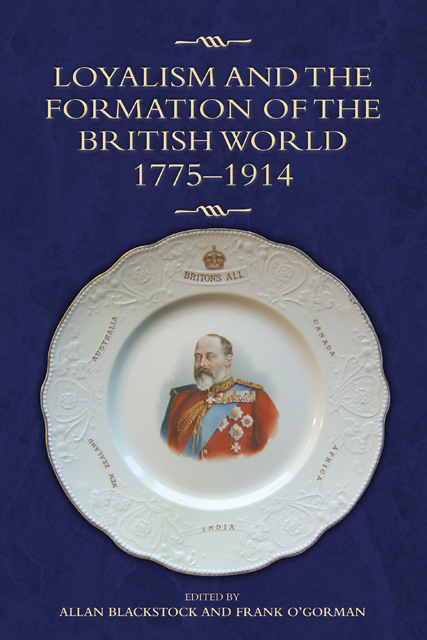Book contents
- Frontmatter
- Contents
- Notes on Contributors
- 1 Loyalism and the British World: Overviews, Themes and Linkages
- 2 Origins and Trajectories of Loyalism in England, 1580–1840
- 3 The ‘Spirit of Loyalty’: Material Culture, Space and the Construction of an English Loyalist Memory, 1790–1840
- 4 Anti-Catholicism and Orange Loyalism in Nineteenth-Century Britain
- 5 Loyalty and the Monarchy in Ireland, c.1660–c.1840
- 6 The Trajectories of Loyalty and Loyalism in Ireland, 1793–1849
- 7 Presbyterians, Loyalty and Orangeism in Nineteenth-Century Ulster
- 8 Unionists and Patriots: James Whiteside, the Irish Bar and the Dilemmas of the Protestant Nation in Victorian Ireland
- 9 Loyalism in British North America in the Age of Revolution, c.1775–1812
- 10 ‘A Colonial Hybrid’: Nineteenth-Century Loyalism as Articulated by the Orange Order in the Maritime Colonies of British North America
- 11 Canadian Catholics, Loyalty, and the British Empire, 1763–1901
- 12 Loyalism in Australasia, 1788–1868
- 13 ‘We love one country, one queen, one flag’: Loyalism in Early Colonial New Zealand, 1840–80
- 14 Clientelism, Community and Collaboration: Loyalism in Nineteenth-Century Colonial India
- Select bibliography
- Index
5 - Loyalty and the Monarchy in Ireland, c.1660–c.1840
Published online by Cambridge University Press: 28 February 2023
- Frontmatter
- Contents
- Notes on Contributors
- 1 Loyalism and the British World: Overviews, Themes and Linkages
- 2 Origins and Trajectories of Loyalism in England, 1580–1840
- 3 The ‘Spirit of Loyalty’: Material Culture, Space and the Construction of an English Loyalist Memory, 1790–1840
- 4 Anti-Catholicism and Orange Loyalism in Nineteenth-Century Britain
- 5 Loyalty and the Monarchy in Ireland, c.1660–c.1840
- 6 The Trajectories of Loyalty and Loyalism in Ireland, 1793–1849
- 7 Presbyterians, Loyalty and Orangeism in Nineteenth-Century Ulster
- 8 Unionists and Patriots: James Whiteside, the Irish Bar and the Dilemmas of the Protestant Nation in Victorian Ireland
- 9 Loyalism in British North America in the Age of Revolution, c.1775–1812
- 10 ‘A Colonial Hybrid’: Nineteenth-Century Loyalism as Articulated by the Orange Order in the Maritime Colonies of British North America
- 11 Canadian Catholics, Loyalty, and the British Empire, 1763–1901
- 12 Loyalism in Australasia, 1788–1868
- 13 ‘We love one country, one queen, one flag’: Loyalism in Early Colonial New Zealand, 1840–80
- 14 Clientelism, Community and Collaboration: Loyalism in Nineteenth-Century Colonial India
- Select bibliography
- Index
Summary
From the 1530s onwards, the question of loyalty to the monarch became one of the most contentious issues facing the Tudor, Stuart and Hanoverian dynasties. Thanks to the break with Rome, monarchs found it expedient to require evidence – in the form of a proliferation of state oaths – not only of their subjects’ temporal allegiance (which was not new) but also to their position as heads of the reformed church. The ensuing debate about the legitimate scope of the crown’s prerogative drew in Catholics and took on European dimensions. Moreover, the enlargement of the crown’s authority, testing enough in a merely English context, was complicated by the need to seek approval in Ireland (designated a distinct kingdom from 1541) and in Scotland, following the union of crowns in 1603; and by the existence, after 1689, of rival claimants to the throne. Matters were further complicated by the legislative union of England and Scotland in 1707, and during the eighteenth century the use of state oaths in England became increasingly restricted to the political elite. However, in Ireland, thanks to the fact that only a minority of the population adhered to the state church, the particular understanding of loyalty inculcated by state oaths retained their significance beyond the elite rather longer. This chapter will consider the emergence of distinctive Irish versions of loyalism in the period from the Restoration down to the 1840s. It will explore the conditionality of Protestant loyalism, and how competition to express the most genuine loyalty served to bring in lower-class Protestants, while narrowing opportunities for Catholic loyalty. In this respect, it will also consider how, in the Irish context, libertarian Whig loyalty became ‘Protestant Ascendancy’ loyalty.
1660–90
The death of Oliver Cromwell in 1658 produced new, and ultimately insurmountable, challenges to the Protectorate, and the ensuing instability that followed prompted a growing willingness in all three kingdoms to contemplate the return of monarchy. Given the disastrous impact of the Cromwellian regime on their fortunes, Irish Catholics were understandably anxious to emphasise their own claims to preferential treatment. During the early seventeenth century the idea of ‘the crown of Ireland’ had been grafted on to the ancient Irish ideology of kingship; and the authority of the crown, and the right of the Stuarts to the inheritance of the Irish crown, had been vindicated by most Catholic writers, both Old English and Old Irish.
- Type
- Chapter
- Information
- Loyalism and the Formation of the British World, 1775-1914 , pp. 81 - 102Publisher: Boydell & BrewerPrint publication year: 2014

